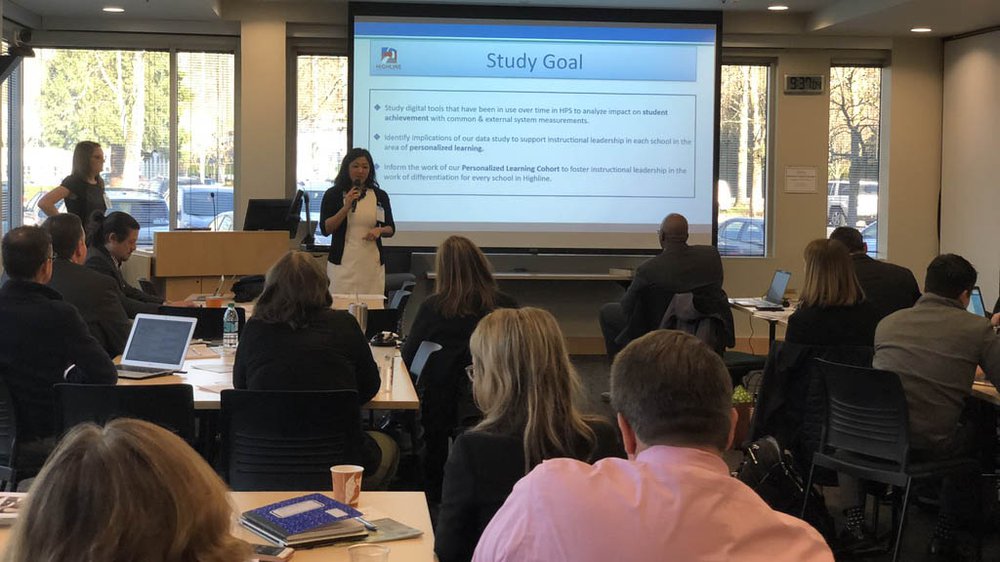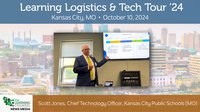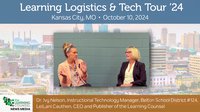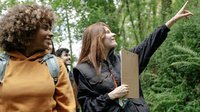The Learning Counsel came to Seattle, WA on March 6th, 2018 to hold a Digital Transition Discussion. Education professionals gathered to discuss digital transition and view presentations on pressing topics in EdTech as well as engaging in interactive workshop and networking activities. As part of the event, a panel discussion was held, facilitated by Dr. David Kafitz. Here are some highlights from the discussion.
The panelist speakers were:
- Dr. David-Paul Zimmerman – Director for Augmented Intelligence, Machine Learning, Virtual and Mixed Reality Research, Renton Prep
- Rafael Gallardo – Director for Personalized Learning, Puget Sound Educational Service District
Kafitz began the discussion asking, “How have you been addressing the transition in education to this culture of constant change?”
Gallardo responded, “This year we are particularly focused on systems level change, systems level thinking and design, cultural responsiveness and deeper learning.” He went on to discuss how his district has been working to identify priorities and leadership. They are creating opportunities for leaders to discuss topics with their district such as personalization, A.I., and what the future of education will look like. He was also involved in the creation of the Puget Sound Center for Personalized Learning (PSCPL) to help facilitate learning and collaboration around advancing personalized learning techniques. Regarding the PSCPL he stated, “It’s meant to have a progression of learning, so that we are stepping away from the one-off workshops and stepping away from folks wanting to come in and get a strategy and immediately trying to implement it.”
Zimmerman shared, “The shift for us was intentional but also was incredibly difficult.” Now that his district has implemented progressive, modern and effective learning tactics, education organizations from over 17 countries have come to visit his school this year. He said, “They don’t come to really talk to me or to the Executive Director, they come to talk to our students, and that’s what fascinates me. There’s been a shift from me as an expert, or our teachers as experts, to the students. There are students, even in Kindergarten, that can tell you what they are doing, not just the answer.” He went on to add, “The cultural shift for us has really been letting students tell us how they see the world, and how they want to be educated.”
Kafitz then asked, “What do you think you will need to do to sustain this constant change?”
Gallardo noted that to assist with sustainability, schools need safe spaces for innovation from leaders. Allowing for creation of and testing new, innovative methodologies, as opposed to locking down curriculum, would offer greater agility and potentially improved and streamlined processes. He said, “There is a wide spectrum of things that we should be doing and that we should be talking about. Stop trying to control it so much that we lose an opportunity for students to lead what that looks like for ourselves.”
Zimmerman noted how his school has implemented a total redesign of curriculum. Teachers often will only speak for ten minutes before students begin their activities. In the mornings, the activities are content based, in the afternoons the activities are project based. He has witnessed a lot of student collaboration and interaction which he finds has been very positive for students and their achievements. In the last year, Renton Prep sent students, in the 4th-9th grades, to do presentations at education conferences. At the conferences, these students shared with the entire audience what they see as being necessary for schools to offer to be able to deliver effective, modern educations.
Zimmerman also shared, “I depend on teachers a lot, but our biggest struggle is finding teachers who understand that they are going to release a lot of their power to kids. Kids don’t want to be rescued, they want to be empowered to change the world.”
Kafitz inquired, “Thinking of the future of education that technology is enabling, can you share what you think will make a big difference in not-so-distant future?”
Zimmerman commented that a great advancement would be having students wear an electroencephalogram (EEG) device which measures electrical activity in the brain. After wearing this device for a short time, it would collect data which then could be analyzed by A.I. to see how students were learning in different environments and with different topics. This data then could help teachers to personalize the environment for students to ensure they are optimizing the learning experience based on learner’s natural strengths.
Gallardo noted that he is looking forward to getting past the skepticism of how technology can enable what students learn and how they learn it. He said, “We need to think about the future. If we’ve been running the same model for over 100 years and we know it’s not working, we know it hasn’t worked, and yet we keep doing it, let’s leverage what we have in certain technology, let’s think forward.”
Zimmerman also shared a heartening comment on the Learning Counsel, “The reason I am so committed to this company is because their research is flawless. They have done their work and I read everything that comes out. I just read LeiLani’s book and I couldn’t put it down. I read it all through the night and sent it out to 4,000 people saying, “You really need to look at this because it provides answers to questions that I have been searching for.”
**
If you would like to attend an event, check out the schedule of Learning Counsel’s Digital Transition Discussions to find an event near you. To join the conversation online, visit KnowStory.com, create a profile and join the Learning Groups you are interested in!











